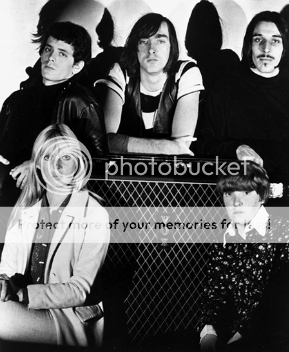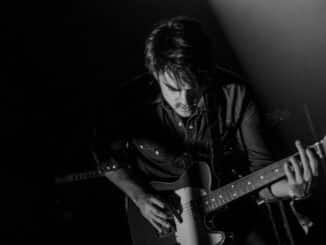 On their first two albums, The Velvet Underground & Nico (1967) and White Light / White Heat (1968), The Velvet Underground plumbed the depths of chaos, cacophony, hard drug addiction, alternative sexuality, decadence, death and the social complexities of avant-garde artist Andy Warhol’s glittering demi-monde. But by 1969, they’d reached a turning point. Founding member John Cale had left the group—a move which altered the Velvet’s delicate and volatile chemistry, placing artistic control firmly in the hands of the band’s co-founder, Lou Reed. Reed took the Velvets in a surprising new direction for their third album, simply titled The Velvet Underground. Disarmingly gentle, the record placed a strong emphasis on introspective ballads and subtle guitar interplay.
On their first two albums, The Velvet Underground & Nico (1967) and White Light / White Heat (1968), The Velvet Underground plumbed the depths of chaos, cacophony, hard drug addiction, alternative sexuality, decadence, death and the social complexities of avant-garde artist Andy Warhol’s glittering demi-monde. But by 1969, they’d reached a turning point. Founding member John Cale had left the group—a move which altered the Velvet’s delicate and volatile chemistry, placing artistic control firmly in the hands of the band’s co-founder, Lou Reed. Reed took the Velvets in a surprising new direction for their third album, simply titled The Velvet Underground. Disarmingly gentle, the record placed a strong emphasis on introspective ballads and subtle guitar interplay.
“I didn’t want to do the same thing again,” Reed recalls. “After ‘Sister Ray’ [the disturbing musical orgy from the Velvets’ White Light/White Heat], I wanted to go in another direction. And I had a bunch of other kinds of songs.”
The Velvet Underground is filled with songs that, in one way or another, question the hedonism documented by Reed in many of his earlier works. The disc opens with the deliciously world-weary lines, “Candy says, ‘I’ve come to hate my body. And all that is requires in this world.’ “ The classic “Candy Says” was written by Reed about drag queen and Warhol scenester Candy Darling. It was sung by Doug Yule, who’d been recruited from the Boston folk rock group the Grass Menagerie as John Cale’s replacement. Reed might perhaps have sung the song himself on the recording date had he not overtaxed his voice doing a live gig the previous evening.
“That would happen sometimes,” he recalls. “I’d blow my voice out. And on ‘Candy Says,’ I thought Doug had this innocent quality to his voice that was nice for the song. Plus, I don’t think he really got it—what the song was about—which was kind of perfect.”
Looking back from a vantage point of some 40 years, Reed sees The Velvet Underground as an album “bordering on a concept”: a suite of songs that “answers,” in Reeds words, many of the preoccupations—sexual and otherwise—of the first two Velvet album as follows:
“It starts out with ‘Candy says she hates her body.’ She doesn’t know. Then comes ‘What Goes On’—the guy really doesn’t know. It’s all really talking about the same thing. “Some Kinda Love” is saying any kind of love is cool. ‘Pale Blue Eyes’ is a song about adultery. ‘Jesus’ is about forgiveness. “Beginning to See the Light”—starting to get forgiven. Therefore, ‘I’m Set Free.’ ‘That’s The Story of My Life.’ And then comes ‘The Murder Mystery,’ which is pure gibberish. It was a poem that I wrote that was published in Paris Review. We set it to music. I did part of the reading. Maureen [Tucker, the Velvets’ drummer] did part, and Sterling [Morrison, Reed’s co-guitarist in the Velvets] did part. The idea was to have different bunches of words expressing different emotions in different rhythms, all coming at you at once. And I called it ‘The Murder Mystery’ because, after it was finished, we listened to it and said, ‘What the fuck is that?’ [laughs] Then the last song, ‘After Hours,’ is like, ‘aw fuck it.’ It’s sitting in the bar, afterwards, considering the whole thing.”
————————————————————
The latter song was sung with childlike simplicity by Tucker, whose performance recalls the innocent of Yule’s vocal on “Candy Says,” thus bringing the album full circle. While The Velvet Underground was an intriguing departure from the band’s first two albums, the disc didn’t fare any better with the general record-buying public than its two predecessors had. Reed’s writing continuously eluded the hippie-centric late Sixties rock audience and didn’t gain wider appreciated until his solo career took off during the Seventies glam era.
He is frankly amused at the frequently voiced, revisionist critical suggestion that his gentler tone on The Velvet Underground was an attempt to score commercial breakthrough for the band.
“A commercial breakthrough for us? You gotta be kidding. A friend of mine recently pointed out something pretty hilarious. He said, ‘Do you realize what the other records were that were coming out when you guys were doing all this?’ That’s when it starts getting pretty funny. We couldn’t have been more underground—short of recording on a two-track and putting out seven copies for our friends. “What was great about that time period is that the whole thing had blown open. The record companies hadn’t a clue what to do. So people were recording whatever they wanted, without interference. The record companies couldn’t stand listening to the music, and therefore they left you alone with it. So a lot of amazing things got accomplished them.”
Gear-Vault Classifieds is an eBay alternative. Come sell your used guitars and amps with us, for FREE!





Be the first to comment